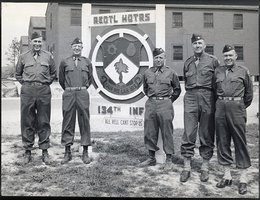

Regular military units are generally made up of men and women from different regions of the country. National Guard units are based in individual states. So, when a state’s National Guard unit distinquishes itself, it is often a source of pride for the entire state. That was the case with the 134th National Guard unit from Nebraska during World War II.
Nebraska’s National Guard were among the first Nebraskans to go to war. In reaction to the war in Europe, the 134th Regiment — "Nebraska’s Own" — mobilized in December, 1940, as part of the Thirty-fifth Division and assembled at Camp Joseph T. Robinson in Arkansas under the command of Butler Buchanan Miltonberger.
Lt. Col. Butler Miltonberger was a native of North Platte, Nebraska, and began his career as a private in June of 1916 when the National Guard was mobilized during the Mexican border dispute. During World War I, he fought with the Fourth Division in the Argonne and returned to North Platte as a first sergeant.
As a civilian, he worked in North Platte as a postman while also being engaged in bridge building, surveying, and road construction.
Miltonberger eventually worked his way up to become commander of the 134th Infantry and was promoted to the rank of major in 1933. In 1935 his unit was called into active duty during both the Omaha streetcar riot and the Republican River flood. He single-handedly captured Willard Brucks, an escaped killer who had broken into the Omaha armory to seize weapons. He was promoted to lieutenant colonel in 1940.